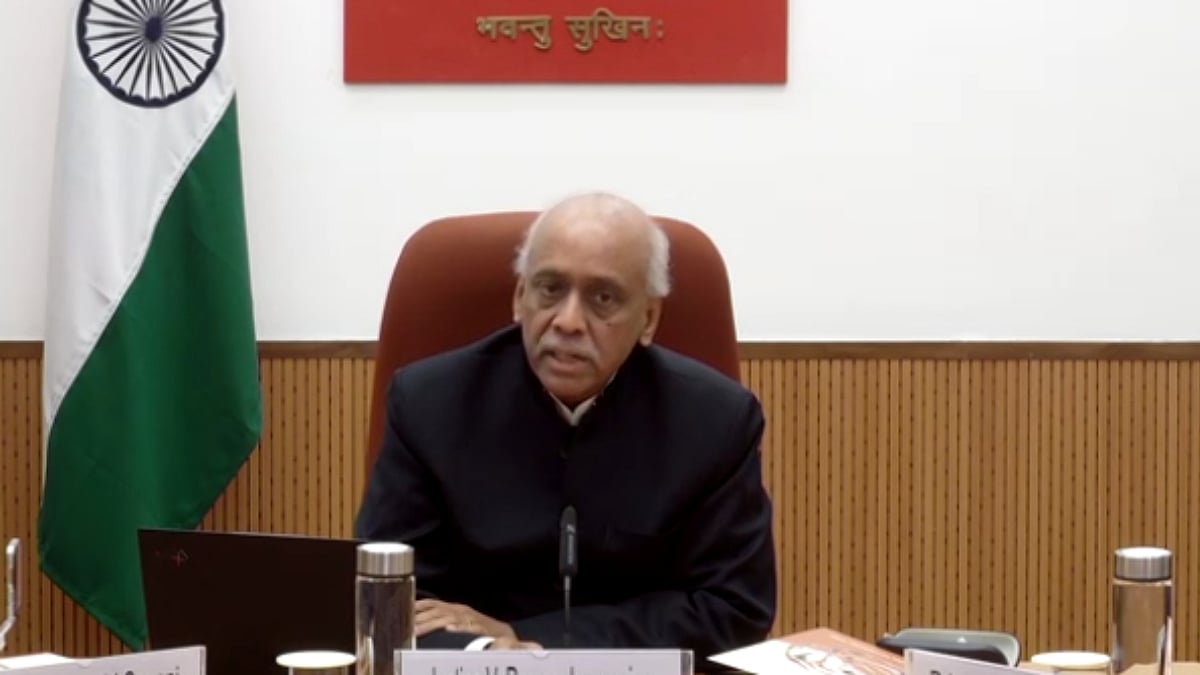Justice Shri V Ramasubramanian, Chairperson, National Human Rights Commission (NHRC), India | File Photo
Justice Shri V Ramasubramanian, Chairperson, National Human Rights Commission (NHRC), India today said that it is necessary to have authentic and verified data on the children in conflict with the law to have a clear understanding of their problems and make suggestions to address them. He was chairing the meeting of the Commission’s Core Group on Children focused on the theme ‘Human rights of children in conflict with law’ in the presence of Member, Smt Vijaya Bharathi Sayani, Secretary General, Shri Bharat Lal, senior officers and expert speakers at its premises in New Delhi today. The meeting was attended by a number of senior officers and experts working in the field.
Justice Ramasubramanian said that going by the discussion on the subject, two major concerns have emerged including how to collect data and how to authenticate the data already available on the children in conflict with law. Therefore, he concurred with the suggestion to constitute a working group of experts to check and authenticate the available data related to the children in conflict with the law, particularly their age and numbers and not necessarily their identities in coordination and consultation with the Bureau of Police Research and Development (BPR&D), National Crime Records Bureau (NCRB), National Legal Services Authority (NALSA) and different High Courts.
The NHRC, India Chairperson also asked the experts working in the field of Juvenile Justice Care to segregate their suggestions to bring improvements by amendments in statutes, changes in rules or by SOPs, as part of the long-term and short-term measures to bring improvements in the area of the Juvenile Justice System. He also concurred with the suggestion to organise State-wise meetings of the Juvenile Justice Boards, District Legal Services Authority, State Legal Services Authority and the NHRC to find a way forward in terms of their counseling, rehabilitation and reintegration into families.
Referring to the report of a working group called ‘the Commission for the Application of Alternative Measures’ under the auspices of UNICEF titled ‘Rights of Children in Conflict with the Law 2007’, the NHRC Chairperson expressed the hope that the NHRC core group could develop solutions for Juvenile Justice Care on those lines which included recommendations for developing diversion programmes;
i.) Juvenile offenders must admit to the crime;
ii.) Juvenile offenders should not be placed in custody to participate in diversion programmes;
iii.) Juvenile offenders are entitled to a court procedure if they or their guardians disagree with the diversion measures;
iv.) Juvenile offenders may withdraw from the diversion process at any time and opt for the formal court procedure.
The diversion programme includes seven components: victim-offender mediation, admonition, local community corrections councils, joint family meetings, circle trials, juvenile courts, and community service.
The report argues that while crimes are often seen as offences against the state, they should also be viewed from the victim’s perspective, seeking reconciliation. It suggests that allowing juveniles to make amends to society can help them reintegrate faster, without a criminal record, which would help them avoid future employment or social exclusion issues.
Before this, NHRC, India Secretary General, Shri Bharat Lal said that the Commission is committed to ensuring the protection and promotion of child rights. In this context, it has been organizing various consultations on the different thematic issues of the human rights of children and issuing advisories also from time to time. The discussion on the human rights of children in conflict with the law has also been organized to identify the challenges, to suggest measures for improvement in the Juvenile Justice System with a specific focus on juveniles in adult prisons, juveniles in correctional homes and measures for rehabilitation of juveniles in conflict with the law. He stressed that juveniles must be viewed as victims of circumstances rather than mere offenders, calling for a focus on rehabilitation measures that would help reintegrate them into society, offering them opportunities for a better future.
NHRC, India Director, Lt. Col Virender Singh gave an overview of the meeting and the three critical areas of discussion significant to the children in conflict with law.
A number of experts and senior officers like Shri Rajeev Kumar Sharma, Director General, BPR&; Ms. Isha Pandey, DIG, BPR&D; Shri Balkrishan Goel, NHRC Special Monitor on Children; Shri Amod K. Kanth, Founder and Mentor Prayas Juvenile Aid Centre (JAC) Society; Prof. Vijay Raghavan, Tata Institute of Social Sciences; Shri Sourabh Ghosh, CRY; Ms Swagata Raha, Legal Researcher, & Head Restorative Practices Enfold India; Adv. Anant Kumar Asthana, Child Rights Lawyer; Ms Deepshikha, Prayas Juvenile Aid Centre (JAC) Society, among others, gave their suggestions and inputs. NHRC DG (I), Shri Ram Prasad Meena and Registrar (Law), Shri Joginder Singh also attended the meeting.
Some of the other suggestions emanated from the discussions are as follows;
Make information on proceedings involving Children in Conflict with the Law available on a portal, without revealing their identity;
Establish a cadre of child protection officials in all States;
Identify and delineate responsibilities within the child protection workforce, and fill vacant positions to strengthen the child care mechanism;
Conduct a social audit of Child Care Institutions, ensuring adequate manpower, including counselors;
Encourage institutional contributions to engage children in useful activities;
Strengthen the Legal Aid Mechanism for Children in Conflict with Law;
Increase ‘Community Service’ as a correctional measure for child offenders;
Revamp rehabilitation and social reintegration programs for Children in Conflict with Law;
Introduce joint training for stakeholders involved in child welfare, focusing on the behavioural aspects of child offenders;
Collate and publicise best practices for the welfare of child offenders across the country;
Increase funding and staff recruitment for Child Care Institutions;
Develop Standard Operating Procedures (SOPs) to streamline the process.
The Commission will further deliberate upon these suggestions and more inputs to finalize its recommendations to protect the human rights of children in conflict with law, in the country.
